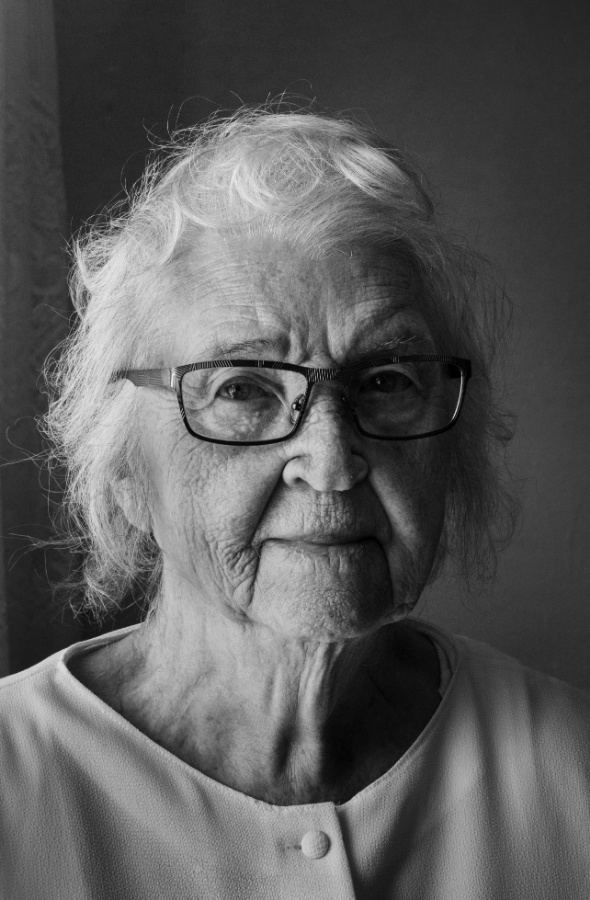Anna BERGEROVÁ (*1929)
- Read the story (PDF, 0 kB)

In our family the women were always courageous
Her idol was her older brother, who refused to fight with the Protectorate Government Army against Poland on the side of Nazi Germany. This led her to later take part in the Slovak National Uprising, in which she served as a messenger and helped injured partisans. She was just 15. She survived everything. The older brother she looked up to was killed by the Germans two days before the war ended.
Anna Bergerová was born in 1929 and spent the first few years of her life in the village of Habura, which was near Medzilaborce and the then eastern border of the country. The place left its mark on her. Not only through the Ruthenian traditions that she maintains to this day but also the left-wing politics that grew out of the impoverished and harsh conditions. There were four children and scarcely enough to eat. Her mother was a member of the interwar Communist Party, though her older brother Vasil, whom she revered as a child, called himself a strong Masaryk supporter.
Vasil was recruited into the Czech Army in 1939 but refused to fight against the Poles. He deserted, earning a death sentence. Anna only learned that he had joined the resistance and hidden out in Prague much later. Her other brother also subsequently joined the resistance.
The year her native Czechoslovakia fell apart Anna was 10. Even as a schoolchild she understood what was going on. That Hitler had invaded Poland and unleashed WWII and that her brother had to flee the country.
Anti-Jewish laws and deportations began later. There were seven Jewish families in Habura. “One of them had nine children. We helped each other out. For an egg they gave us salt or yeast. Their baking yeast was so good that I broke bits off on the way home and mum was then surprised there was so little of it,” Anna Bergerová recalls today with a smile. She turns serious when recounting what became of the family. They weren’t the only ones who didn’t return. Neither did a woman she’d seen in an advanced state of pregnancy. She could no longer walk and the soldiers forced her onto a wagon. A similar fate befell another family acquaintance from Habura, who Anna’s mother had lent her favourite warm dress when she was placed on a transport. She never saw her again. The same went for a friend of hers.
Little Anna observed everything closely. It was 1942 when the first transports left. She also recalls 1943, when her brother Vasil visited just before Christmas. But he didn’t stay long. Almost immediately a deputy notary, a decent person, delivered a warning. Somebody had informed on him and he should get away quickly. He did. To this day Anna remembers the shock of soldiers coming to look for her brother at Christmas. She is convinced that if he hadn’t escaped they would have killed him.
When the Slovak National Uprising erupted on 29 August 1944 three women also got involved – Anna, her mother and sister. They joined the partisans. Anna was then 15. They gave shelter to many men at their house. Among them was a lieutenant from Bodružal, via whom they joined the Čapajev group.
Its members decided to use the young women as messengers. “They deployed us in an area controlled by the Germans,” she says. They were to ascertain the locations of German soldiers. At the time the partisans were planning to attack territory around Čabiny, which trains passed through.
One time when they didn’t complete the mission they had to return. The attack was planned for the night. The first time the girls passed the Germans it went fine. The second time the Germans got suspicious – and little Anna received a blow. “They didn’t beat us up, they just punched me once. My nose started bleeding. When I got back to Závada, where the partisans were camped, and my mother saw me covered in blood she said she wouldn’t let me enter German-controlled territory again.”
Later she became an assistant to the doctor Dolina-Gruber. They worked in harsh conditions and sometimes had to use the shirts of the dead as bandages. To this day she remembers one badly injured university teacher whose arm they amputated. To try to bear it more he asked her to sing while they were bandaging up the wound. She has no idea whether he survived the war.
“When the front passed they advised us to go to Poland for delousing and to rest. Mum wanted to go home at any price. When we arrived we discovered that our whole village had been burned out,” the adventurous lady says. There was no food and people were searching for family members. They were concerned about their cousin Marie who, they discovered later, had signed up for the 1st Czechoslovak Army Corps. “In our family the women were always courageous,” says Anna Bergerová, who for the rest of her life was active in the Union of Anti-Fascist Fighters.
In that organisation she helped honour the memory of those who had fallen. Including the legendary partisan leader Kukorelli, who she knew and whose corpse she had seen. And her brother Vasil, her childhood hero executed by the Nazis.
“To this day these pictures come back to my mind. I believed we’d survive. I put my brother on a pedestal. He was 27 and had everything in front of him,” she says, pointing to photographs of him, which she looks after carefully. That’s all that remains of him.
Text by Sona Gyarfašová